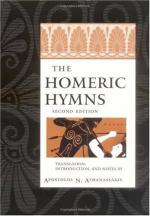|
This section contains 879 words (approx. 3 pages at 400 words per page) |

|
The Nature of the Gods
Classical Greek spirituality was, like many other ancient spiritual systems (Egyptian, Roman, Chinese, Aztec, Native American, etc) is defined as "pantheistic," a word with two facets of meaning, both of which contrast with spiritual systems defined as "monotheistic" (Christianity, Judaism, Islam). Firstly, in pantheism there are several gods, while in monotheism there is only one (mono=one). Secondly, in pantheism the gods are identified with forces and/or experiences of nature, while in monotheism God is identified as being above nature, with dominion over it.
There are two important points to note here. The first is that nature in a pantheistic context not only refers to what contemporary society understands nature to mean (the earth, the sea, the sky, plants, animals, etc.), but also to HUMAN nature. This is why there are not only gods of (for example) storms, rivers, the sun and/or...
|
This section contains 879 words (approx. 3 pages at 400 words per page) |

|




